SAFE SPACES - START the CONVERSATION
Youth advocating for Youth
Underage drinking in media bringing awareness to the negative impact on youth Listen to the Podcast Episode
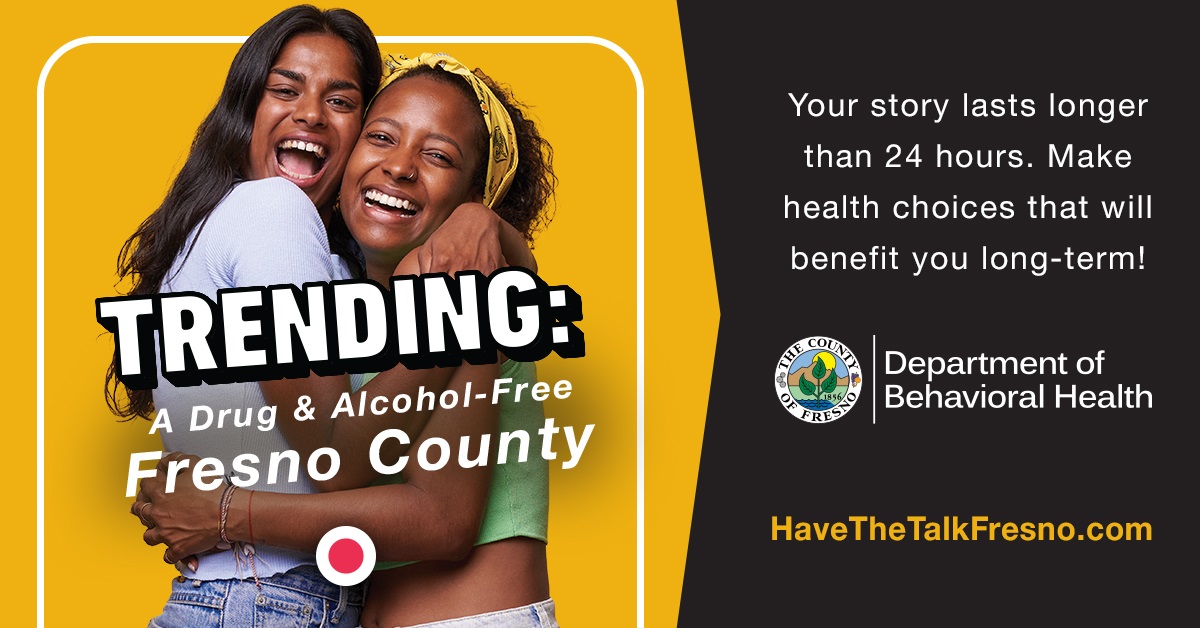
Is your drinking a problem? Take the 10-question screener to see where you stand.
Create a safe space for your kids and help prevent substance use. Talking about substance use can be uncomfortable, but together we can find the courage to have those difficult conversations and it begins with creating a safe space.
A safe space is an environment where a person feels confident, they will not be exposed to discrimination, harassment, or any other emotional or physical harm. It is important to understand that safe spaces can be anything beyond a physical place, it may also include a person, an emotion and even a way of thinking.
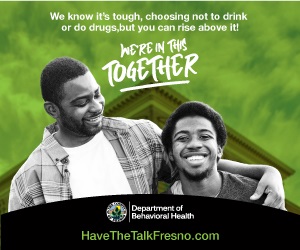
For Parents
How to Build a Safe Space
- Make your physical environment inviting - Create a comfortable space to talk to your kids by finding a location that's open and has a feeling of being relaxed.
- Be a Go-To Parent - Make kids aware that you are and can be a positive outlet for communication when dealing with unhealthy situations.
- Monitor your emotions - Avoid negatively contributing to already heavy or unsettling situations.
- Your actions speak louder than words - Watch your body language and your expressions, kids pick up on your actions as much as they do your words.
- Give your kids space to talk - Allow for your kids to have time to answer. Silence can be uncomfortable at times but it can allow for kids to form their thoughts.
- Give it time - You might make time to talk about substance use with your kids and end up talking about something else, that's ok, talk about substance use when you can.

For Youth
How to identify & maintain your safe space
- Identify a positive adult influence in your life - It can be a parent/guardian, sports coach, faith-leader, older sibling, or mentor.
- Define what activity, location or person help you with challenging situations – It can be anything that allows you to deal with a negative situation and provides an escape. It can include, outdoor activities, creative outlets-music, or art.
- Remind yourself that you are not alone - there are ways in dealing with unhealthy situations.
Drug Abuse Awareness & Prevention
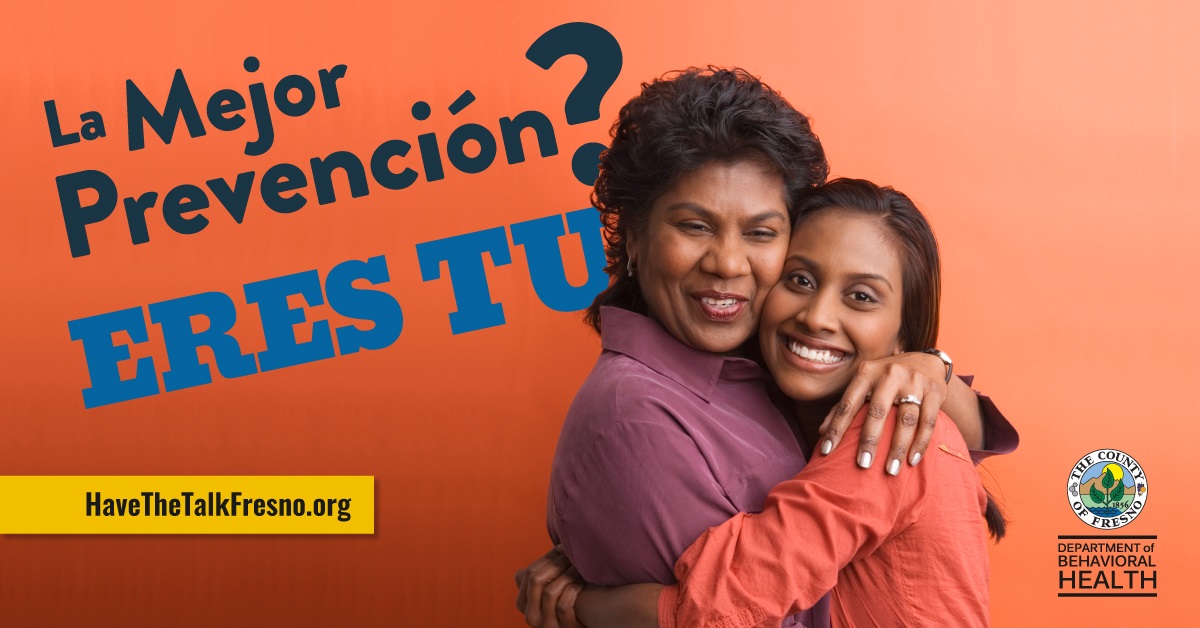
PREVENCIÓN Y INFORMACION DEL ABUSO DE DROGAS
Una guía para padres y personal de escuela(PDF, 788KB)
Local Resources for Parents
Youth Leadership Institute
Fresno County Friday Night Live Program
YLI’s mission is to build communities where young people and their adult allies come together to create positive community change that promotes social justice and racial equity. Similarly, FNL’s mission is to build partnerships for positive and healthy youth development which engage youth as active leaders and resources in their communities.
Friday Night Live (FNL) is a statewide organization that addresses underage substance abuse. At YLI, we take a social justice lens to the work, shifting the focus from individual behaviors to the larger patterns of injustice that target young, low-income people of color and encourage unhealthy behaviors. By helping youth identify issues in their communities, conduct research, and implement media and policy campaigns, YLI doesn’t simply deter young people from substance abuse – they help to shape powerful advocates who create lasting change in their communities. YLI staff lead a number of chapters in Fresno County.
The resources identified below are for both youth and adults in Fresno County
- Family Alcohol Policy - The Family Alcohol Policy is a resource for families to engage in a safe conversation regarding alcohol consumption in the homes and at family events.
- Social Host Ordinance Leaflet- The Social Host Ordinance leaflet is meant to help explain and dispel myths about the Social Host Ordinance.
- Sunnyside PSA Videos in Spanish, English and Hmong- The Sunnyside PSA videos help share information about youth access to alcohol at family celebrations and events, and provides an opportunity for adults to pledge not to provide alcohol to minors in their home or at family events
- https://youtu.be/wIID8G_ffSA
- https://youtu.be/vd4LSeoX19k
- Kerman 101 Fun Things - Kerman 101 Fun Things is meant to give youth healthy alternative activities to drinking alcohol.
Link to the Friday Night Live program
https://yli.org/program/fresno-county-pei/
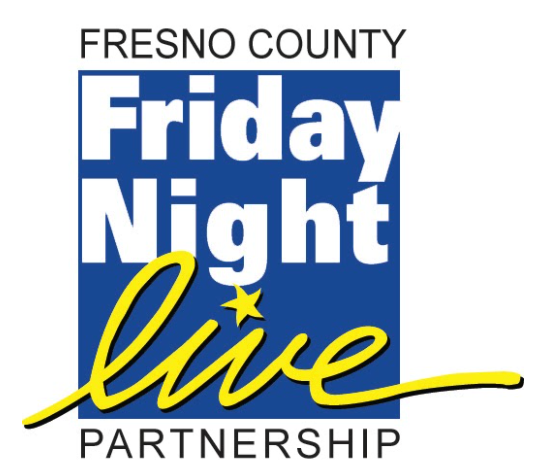
What is the best prevention??? You

What is Prevention?
90% of people who have a substance use disorder (SUD) started using alcohol or drugs before they turned 18. By practicing prevention and delaying the onset of first use, you can help to protect the brain during this important period of development.
Anyone that has children knows how fast they grow up. As parents (caregivers) we all wish the best for them and try to protect them from making decisions that could damage their future.
Substance abuse in adolescence and young adulthood can lead to tragic immediate consequences (e.g., accidents, overdoses) but it can also lead to the development of Substance Use Disorders (SUDs) which most people know as "addiction."
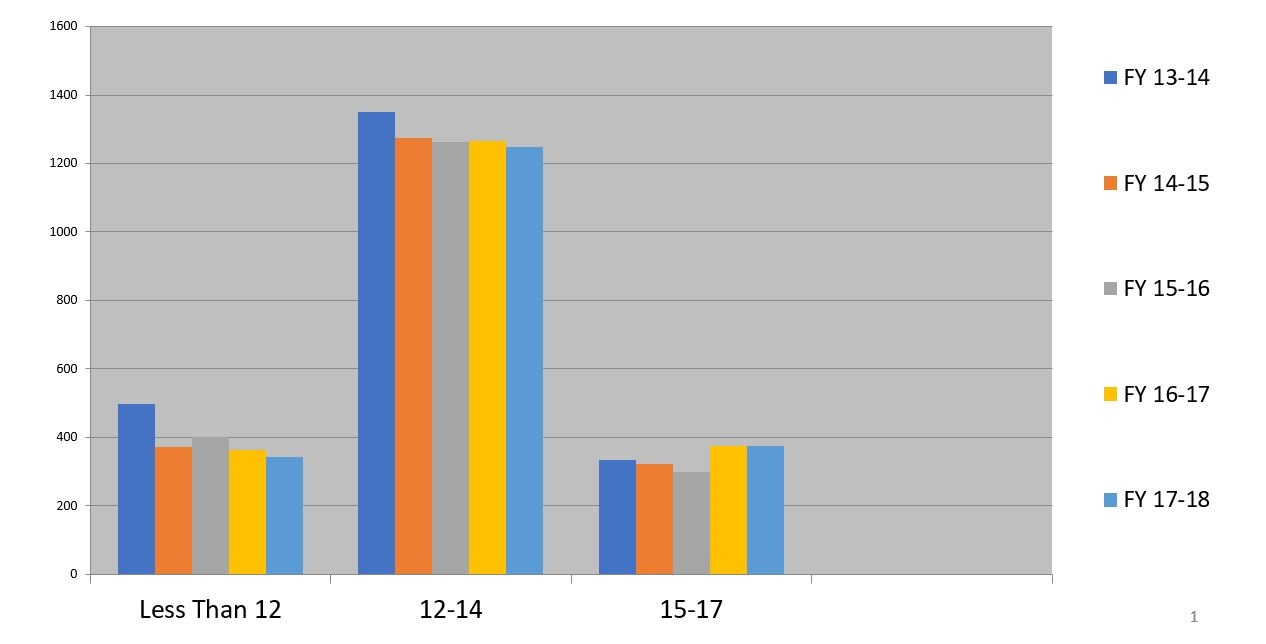
ADOLESCENT AGE OF FIRST USE FRESNO 2013-2018
When a SUD develops and continues into adulthood it has the potential to destroy healthy relationships, impact educational and employment opportunities, cause long-term health problems (physical and mental) and can be fatal.
Nearly all SUDs in adulthood begin before the age of 25. This is due to the large number of "risk factors" that contribute to early drug/alcohol use and because the human brain is still developing until the age of 25.
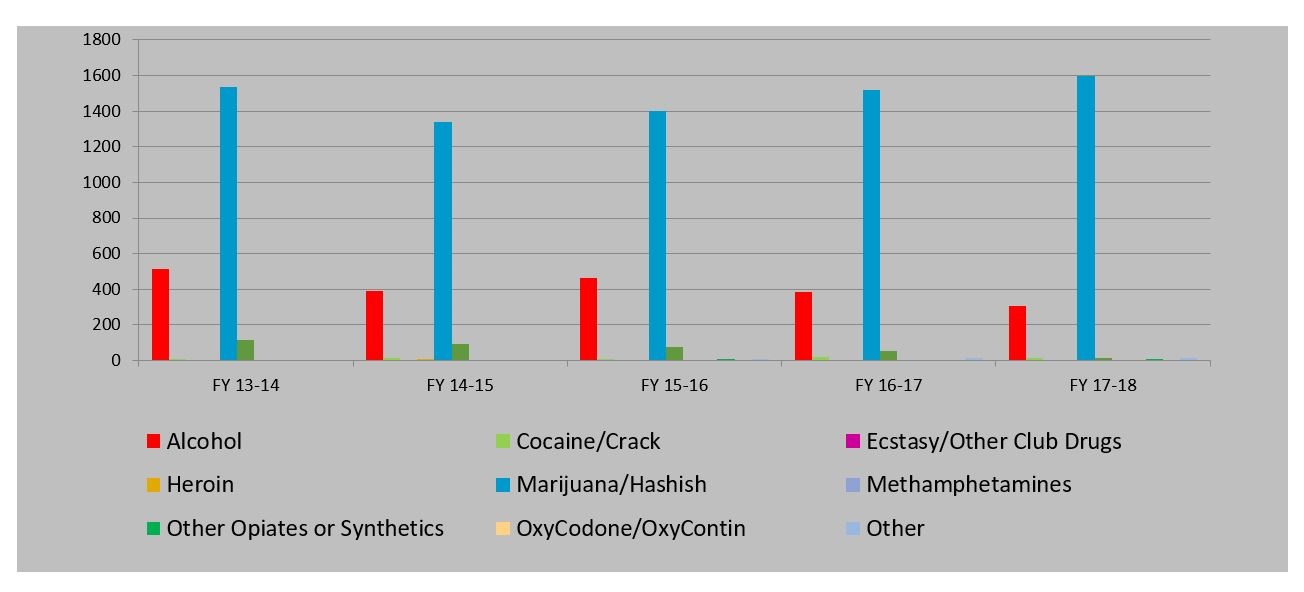
ADOLESCENT PRIMARY SUBSTANCE AT ADMISSION FRESNO 2013-2018
Young brains have a high capacity for learning, but what makes a young developing brain able to learn and retain vast amounts of information also makes it vulnerable to the toxic effects of drugs/alcohol. Adolescents and young adults under the age of 25 are most vulnerable.
In Fresno County, just under 40% of the population is under the age of 25. The average age of first-time reported drug/alcohol use in Fresno County is between the ages of 12-14 (7th-9th grade) and the primary substances abused by people under the age of 25 is marijuana and alcohol.
(see graphs below).
Risk Factors
A “risk factor” is anything that contributes to the development of a problem. Risk factors for SUDs fall in three broad categories; environmental, individual, and genetic (see examples below):
Environmental
- Access to drugs/alcohol
- Parental substance abuse
- Lack of parental supervision
- Favorable familial, cultural, and community views on substance use.
- High levels of stress in environment (e.g., poverty, domestic violence, abuse, neglect)
- Peer pressure
Individual
- Mental Illness
- Adverse Childhood Experiences (ACEs) (e.g., sexual abuse, physical abuse, neglect, parental absence)
- Early aggressive behavior; poor social skills
- Need for acceptance
Genetic
- Using drugs/alcohol while unknowingly carrying any combination of the 89 inheritable genes that science has demonstrated contribute to the development of a SUD.
Knowing the common risk factors that contribute to SUDs is the first step in reducing the likelihood that a SUD will develop, and it gives parents and caregivers an advantage when it comes to preventing the problem.
Working to help reduce risk factors is the first and best line of defense. Due to brain changes that happen through repeated toxic exposure to drugs/alcohol, SUDs are much harder to treat once they develop. SUDs can be brought into remission but there is no cure.
SUDs are a medical problem. Like many medical problems there are warning signs and early indicators that a problem may be developing. Both SUDs and mental health issues involve the brain and therefore result in thinking and behavior changes that are often observable to others (see examples below).
Signs/Indicators
- Change from healthy to unhealthy friends or isolation from friends & family
- Uncharacteristic risk-taking behavior (reckless driving, risky sexual behavior)
- Decline in work/academic performance
- Absenteeism at work/truancy at school
- Loss of interest in extracurricular activities
- Dramatic, frequent mood shifts; emotional instability
- Sudden weight loss/gain
- Changes in sleeping eating patterns
- Unsteady gate, clumsiness, poor coordination
- Chronic flu like symptoms/Chronic Illness
- Repeated medical appointments with multiple doctors to obtain mood altering drugs
- Avoids eye contact, sunglasses/hoodies indoors
- Lying, deceitfulness
- Disappearance of prescription medication, money, valuables
- Needle marks on arms, or warm clothing in hot whether to hide track marks
- Stashes of drugs or paraphernalia (lighters, foil, straws, prescription bottles)
Significant, sudden, long-term, and uncharacteristic changes in the behavior of an adolescent or young adult should be taken seriously and help should be sought, particularly when there are identifiable risk factors in the young person’s life.
This is where parents and caregivers come in. Just as there are risk factors that contribute to the development of SUDs, there are also protective factors that make the development of SUDs less likely to develop.
Protective Factors
A “protective factor” is anything that reduces the likelihood that a problem will occur. Just as risk factors contribute to potential harm in three broad categories (environmental, individual, and genetic), strengthening protective factors helps reduce the likelihood that a SUD will develop, thus reducing harm (see examples of protective factors below).
Environmental
- Setting a no substance use policy in the home
- Locking up alcohol and prescription drugs
- Limiting easy access to and monitoring entertainment that romanticizes substance abuse
- SUD/Domestic and Violence/Mental Health treatment services for parents/caregivers that need it
- Parenting classes for those that need it
- Mentorship for at risk kids; regular contact with at least one healthy adult
- Parent/caregiver monitoring of child’s friends and activities
- Parent/caregiver involvement in the child's academic development
- Family involvement in healthy extra-curricular and community activities
- Working to change familial, cultural, and community views on substance use through policy
Individual
- Early detection and intervention of anti-social behavior displayed by a child/adolescent.
- Counseling for any adverse childhood experiences in a child's life (e.g., sexual abuse, physical abuse, neglect, parental divorce, parental death, or incarceration).
Genetic
- Having a discussion with the child, adolescent or young adult about the possibility of inheriting a genetic predisposing for a SUD especially if there is known family history of SUDs.
Many parents and caregivers do not think of themselves as a “protective factor” but they are the most potent and effective form of SUD prevention that there is. Even when children, adolescents, and young adults appear not be listening or paying attention they are.
Most of the protective factors listed above require involvement from at least one health parent/caregiver. Our youth look to us for direction and this requires that we understand the risks our youth face and how to insulate them through the use of protective measures.
This requires parents/caregivers to be knowledgeable about the issue, set boundaries in the home and outside the home, monitor activities and associates, maintain continuous dialogue with those under your care, and be willing to seek help yourself if you think you may be struggling with a SUD or Mental Health problem.
Help is available. If you feel that your child may be at risk, may need treatment, or as a parent you need help please contact the SUD Access Line at 1 800 654-3937 for a confidential screening.
Screenings may also be conducted through any of the three resources listed below.
Local Resources/Treatment Links
Urgent Care Wellness Center
4441 E. Kings Canyon Rd. Fresno CA
(559) 600-9171
Youth Wellness Center
4411 E. Kings Canyon Rd. Fresno CA
(559) 512-8700
DBH Contracted Providers
SUD Provider Directory
SUD Prevention
SUD Treatment
If you have a Behavioral Health emergency
please call 9-1-1
For Access to Services or the Crisis Line,
1 800 654-3937
CalHOPE Warm Line
1 833 317-HOPE(4673)
Central Valley Suicide Prevention Lifeline
988